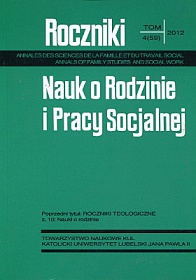The Significance of Religion in the Life of a Family with a Handicapped Person
Abstract
Faith in God plays an extraordinarily significant role in the life of handicapped persons and of their guardians. Most respondents treat faith as a support and a source of strength for resolving problems posed by everyday life. The more difficult the living situation caused by the level of the disability, the deeper the trust in God and giving oneself up to Him is. Every third subject of the study indicated that without faith he/she cannot imagine his/her life, and nearly every fifth respondent is convinced that owing to faith the miracle of healing and return to a complete ability may happen. The Holy Mass is a profound religious experience for most of the respondents, giving them consolidation in their difficult living situation. Only few treat the Holy Mass as a habit, a custom, or a thing that is necessary because of the pressure from the people around them. Also the fact that persons with a considerable disability declare experiencing the Holy Mass more profoundly than those whose physical status is decidedly better is an important observation.
References
Acklin M. W., Brown E. C., Mauger P. A.: The Role of Religious Values in Coping with Cancer, „Journal of Religion and Health” 22(1983), s.322-333.
Clark W. H.: How do Social Scientists Define Religion?, „Journal of Social Psychology” 47(1958), s. 143-147.
Geertz C.: Religion as a Cultural System, [w:] Anthropological Approaches to the Study of Religion, red. M. Banton, London 1966, s. 1-46.
Janocha W.: Poczucie sensu życia osób z niepełnosprawnością, Kielce: Jedność 2008.
Jarmoch E.: Religijność indywidualna Polaków, [w:] Kościół i religijność Polaków, 1945-1999, red. W. Zdaniewicz, T.Zembrzuski, Warszawa: Pallottinum 2000.
Mariański J.: Emigracja z Kościoła. Religijność młodzieży polskiej w warunkach zmian społecznych, Lublin: TN KUL 2008.
Mariański J.: Religijność społeczeństwa polskiego w perspektywie europejskiej. Próba syntezy socjologicznej, Kraków: NOMOS 2004.
Pargament K. I.: The Psychology of Religion and Coping. Theory, Research, Practice, New York 1997.
Pargament K. I., Brant C. R.: Religion and Coping, [w:] Handbook of Religion and Mental Health, San Diego 1998, s. 111-128.
Pargament K. I. [i in.]: The Congregation Development Program: Data-Based Consultation with Chuches and Synagogues, „Professional Psychology: Research and Practice” 22(1991), s. 393-404.
Rubin Z., Peplau L. A.: Who Believes in Just World?”, „Journal of Social Issues” 31(1975), s. 65-89.
Sorrentino R. M., Hardy J.: Religiousness and Derogation of an Innocent Victim, „Journal of Personality” 42(1974), s. 372-380.
Tarakeshwar N., Pargament K. I.: Religious Coping in Families of Children with Autism, „Focus on Autism and Other Developmental Disabilities” 16(2001), nr 4, s. 247-260.
Wciórka B.: Pierwsza pielgrzymka Jana Pawła II do ojczyzny – rocznicowe refleksje. Komunikat z badań CBOS. BS/83/2009, Warszawa 2009.

